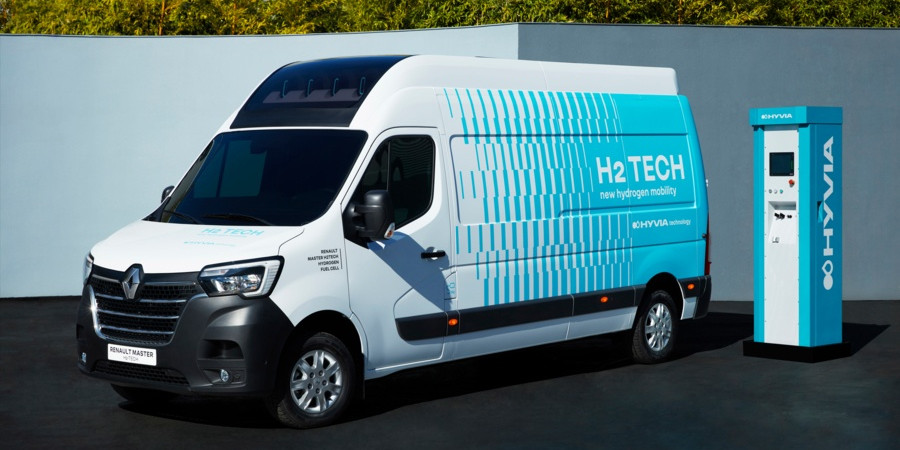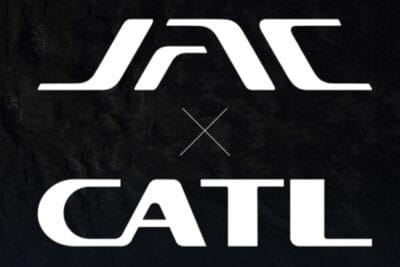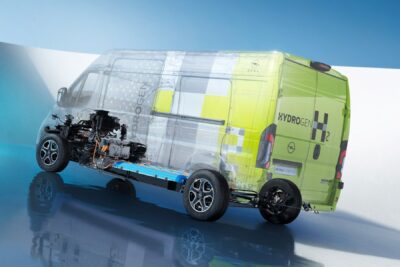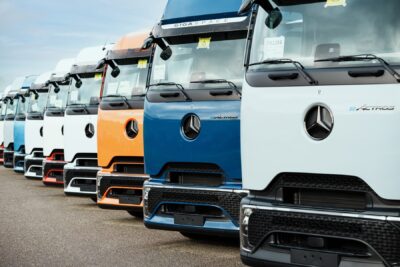Hyvia presents near-series prototype of the Master H2-Tech
Hyvia, the joint venture set up this year by Renault and fuel cell specialist Plug Power, has unveiled near-production prototypes of the Renault Master H2-Tech and its announced hydrogen filling station. The latter will be available for purchase, lease or rent in the future.
The French-Amercian joint venture Hyvia (“Hy” for hydrogen, “Via” for road) was first announced by Renault and Plug Power in January 2021 founded in July with headquarters near Paris. With the H2 van and the compact H2 filling station the company is presenting two examples of its “comprehensive ecosystem for carbon-free mobility”. The Hyvia offering is to include the production, storage and distribution of green hydrogen globally.
The Renault Master H2-Tech is the first of three fuel cell-powered light commercial vehicles that the joint venture plans to launch from 2022 onwards. It has a 33 kWh battery and a 30 kW fuel cell on board. The vehicle sports four tanks on the roof with a total capacity of six kilogrammes of hydrogen. Judging by the photos of the vehicle, both electricity for the battery and H2 for the fuel cell drive can be supplied externally. A connection for hydrogen refuelling can be seen on the driver’s side and a charging port for electricity on the opposite passenger side.
Hyvia itself describes the drive system as a “dual-power architecture” with which the Renault Master H2-Tech should achieve ranges of up to 500 kilometres, including 100 kilometres in battery-only mode. The van holds a load volume of twelve cubic metres for transporting goods. Renault has not yet given data for the battery charging capacity and has only said that the H2 refuelling process for the Master panel van H2-Tech should be completed in five minutes.
The next vehicles to follow this one are the Master Chassis Cab H2-Tech, with a load capacity of 19 cubic metres and a range of 250 kilometres, and the Master Combi H2-Tech, a minibus for up to 15 people with a range of around 300 kilometres. This duo also gets the 33-kWh battery and 30-kW fuel cell used in the H2 Transporter although Renault has said that the size and position of the tanks will vary. Back in July, Renault said that between three and seven kilogrammes of hydrogen could be stored, depending on the model, and that the tanks would be located either in the underbody (chassis cab) or in the roof (panel van and city bus).
As for the timetable, Hyvia originally said that it wanted to offer the three light commercial vehicles by the end of 2021. Now there is talk of “from 2022”, with the panel van definitely to be launched next year.
Hyvia’s hydrogen ecosystem also includes the production and distribution of green hydrogen. Here, Hyvia says it is building on the expertise of Plug Power, which already has a network of 100 H2 refuelling stations that dispense over 40 tonnes of hydrogen a day. The plan is for Hyvia to offer electrolysis solutions, mobile storage stations and hydrogen filling stations. The filling stations will either be purchased, leased or rented.
Photos now show the near-production prototype of a small compact station that Renault says will ensure “fast and safe refuelling operations, just like vehicles with conventional petrol or diesel engines.” The five-minute refuelling time mentioned also applies to this refuelling system. The hydrogen is either produced on-site by water electrolysis or delivered by tank trailers. The system then compresses the H2 in a storage tank and then releases it to vehicles as needed.
Renault describes the H2 filling station as a “convenient refuelling option for customers in areas where the public hydrogen infrastructure is still being developed”. Assembly of the units is due to start by the end of the year at Renault’s plant in Flins, France. The market launch is scheduled for 2022.
Basically, Hyvia wants to concentrate all manufacturing in France. For example, the Master Van will be manufactured at the Batilly plant before the integration of electric and hydrogen propulsion is realised by PVI, a subsidiary of the Renault Group, in Gretz-Armainvilliers. The electric motor is supplied by the Cleon plant, while the fuel cell is assembled at the Flins plant. The hydrogen tanks will be supplied by the French group Faurecia.
As Renault announced in July, the products will be distributed throughout Europe. In addition to the vehicles, Hyvia will also offer “various financing options and maintenance services”. Prices have not yet been revealed.
With reporting by Cora Werwitzke, France.





0 Comments